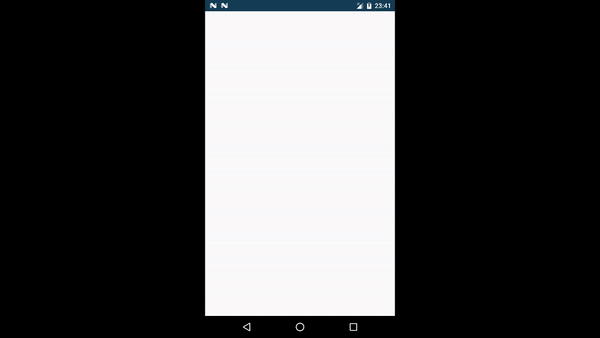Issue
I want to test the text contained in each ViewHolder of my RecyclerView:
@RunWith(AndroidJUnit4.class)
public class EspressoTest {
private Activity mMainActivity;
private RecyclerView mRecyclerView;
private int res_ID = R.id.recycler_view_ingredients;
private int itemCount = 0;
//TODO: What is the purpose of this rule as it relates to the Test below?
@Rule
public ActivityTestRule<MainActivity> firstRule = new ActivityTestRule<>(MainActivity.class);
//TODO: Very confused about Espresso testing and the dependencies required; it appears Recyclerview
//TODO: Requires additional dependencies other than those mentioned in the Android documentation?
//TODO: What would be best method of testing all views of RecyclerView? What is there is a dynamic number of Views that are populated in RecyclerView?
//TODO: Instruction from StackOverflow Post: https://stackoverflow.com/questions/51678563/how-to-test-recyclerview-viewholder-text-with-espresso/51698252?noredirect=1#comment90433415_51698252
//TODO: Is this necessary?
@Before
public void setupTest() {
this.mMainActivity = this.firstRule.getActivity();
this.mRecyclerView = this.mMainActivity.findViewById(this.res_ID);
this.itemCount = this.mRecyclerView.getAdapter().getItemCount();
}
@Test
public void testRecyclerViewClick() {
Espresso.onView(ViewMatchers.withId(R.id.recycler_view_ingredients)).perform(RecyclerViewActions.actionOnItemAtPosition(1, ViewActions.click()));
}
//CANNOT CALL THIS METHOD, THE DEPENDENCIES ARE INCORRECT
@Test
public void testRecyclerViewText() {
// Check item at position 3 has "Some content"
onView(withRecyclerView(R.id.scroll_view).atPosition(3))
.check(matches(hasDescendant(withText("Some content"))));
}
}
}
Below is my gradle as well, I never understood what separate dependencies are required for RecyclerView testing:
dependencies {
implementation fileTree(dir: 'libs', include: ['*.jar'])
implementation 'com.android.support:recyclerview-v7:27.1.1'
implementation 'com.google.android.exoplayer:exoplayer:2.6.1'
implementation 'com.android.support:appcompat-v7:27.1.1'
implementation 'com.android.support.constraint:constraint-layout:1.1.2'
implementation 'com.android.support:support-v4:27.1.1'
testImplementation 'junit:junit:4.12'
androidTestImplementation 'com.android.support.test:testing-support-lib:0.1'
androidTestImplementation 'com.android.support.test.espresso:espresso-core:2.0'
androidTestImplementation('com.android.support.test.espresso:espresso-contrib:2.0') {
exclude group: 'com.android.support', module: 'appcompat'
exclude group: 'com.android.support', module: 'support-v4'
exclude module: 'recyclerview-v7'
}
implementation 'com.android.support:support-annotations:27.1.1'
implementation 'com.squareup.okhttp3:okhttp:3.10.0'
implementation 'com.google.code.gson:gson:2.8.2'
implementation 'com.squareup.retrofit2:converter-gson:2.4.0'
implementation 'com.squareup.okhttp3:logging-interceptor:3.10.0'
androidTestImplementation 'com.android.support.test.espresso:espresso-core:3.0.2'
implementation 'com.android.support:cardview-v7:27.1.1'
implementation 'com.google.android.exoplayer:exoplayer:2.6.0'
}
Also, what if the RecyclerView populates data dynamically? Then you simply could not hard code the position you wanted to test....
Solution
Espresso package espresso-contrib is necessary, because it provides those RecyclerViewActions, which do not support assertions.
import android.support.test.espresso.contrib.RecyclerViewActions;
import android.support.test.rule.ActivityTestRule;
import android.support.test.runner.AndroidJUnit4;
import org.hamcrest.Description;
import org.hamcrest.Matcher;
import org.hamcrest.TypeSafeMatcher;
import org.junit.Before;
import org.junit.Rule;
import org.junit.Test;
import org.junit.runner.RunWith;
import static android.support.test.espresso.Espresso.onView;
import static android.support.test.espresso.action.ViewActions.click;
import static android.support.test.espresso.assertion.ViewAssertions.matches;
import static android.support.test.espresso.matcher.ViewMatchers.withId;
import static android.support.test.espresso.matcher.ViewMatchers.withText;
@RunWith(AndroidJUnit4.class)
public class TestIngredients {
/** the Activity of the Target application */
private IngredientsActivity mActivity;
/** the {@link RecyclerView}'s resource id */
private int resId = R.id.recyclerview_ingredients;
/** the {@link RecyclerView} */
private IngredientsLinearView mRecyclerView;
/** and it's item count */
private int itemCount = 0;
/**
* such a {@link ActivityTestRule} can be used eg. for Intent.putExtra(),
* alike one would pass command-line arguments to regular run configurations.
* this code runs before the {@link FragmentActivity} is being started.
* there also would be an {@link IntentsTestRule}, but not required here.
**/
@Rule
public ActivityTestRule<IngredientsActivity> mActivityRule = new ActivityTestRule<IngredientsActivity>(IngredientsActivity.class) {
@Override
protected Intent getActivityIntent() {
Intent intent = new Intent();
Bundle extras = new Bundle();
intent.putExtras(extras);
return intent;
}
};
@Before
public void setUpTest() {
/* obtaining the Activity from the ActivityTestRule */
this.mActivity = this.mActivityRule.getActivity();
/* obtaining handles to the Ui of the Activity */
this.mRecyclerView = this.mActivity.findViewById(this.resId);
this.itemCount = this.mRecyclerView.getAdapter().getItemCount();
}
@Test
public void RecyclerViewTest() {
if(this.itemCount > 0) {
for(int i=0; i < this.itemCount; i++) {
/* clicking the item */
onView(withId(this.resId))
.perform(RecyclerViewActions.actionOnItemAtPosition(i, click()));
/* check if the ViewHolder is being displayed */
onView(new RecyclerViewMatcher(this.resId)
.atPositionOnView(i, R.id.cardview))
.check(matches(isDisplayed()));
/* checking for the text of the first one item */
if(i == 0) {
onView(new RecyclerViewMatcher(this.resId)
.atPositionOnView(i, R.id.ingredientName))
.check(matches(withText("Farbstoffe")));
}
}
}
}
}
Instead one can use a RecyclerViewMatcher for that:
public class RecyclerViewMatcher {
private final int recyclerViewId;
public RecyclerViewMatcher(int recyclerViewId) {
this.recyclerViewId = recyclerViewId;
}
public Matcher<View> atPosition(final int position) {
return atPositionOnView(position, -1);
}
public Matcher<View> atPositionOnView(final int position, final int targetViewId) {
return new TypeSafeMatcher<View>() {
Resources resources = null;
View childView;
public void describeTo(Description description) {
String idDescription = Integer.toString(recyclerViewId);
if(this.resources != null) {
try {
idDescription = this.resources.getResourceName(recyclerViewId);
} catch (Resources.NotFoundException var4) {
idDescription = String.format("%s (resource name not found)",
new Object[] {Integer.valueOf(recyclerViewId) });
}
}
description.appendText("with id: " + idDescription);
}
public boolean matchesSafely(View view) {
this.resources = view.getResources();
if (childView == null) {
RecyclerView recyclerView = (RecyclerView) view.getRootView().findViewById(recyclerViewId);
if (recyclerView != null && recyclerView.getId() == recyclerViewId) {
childView = recyclerView.findViewHolderForAdapterPosition(position).itemView;
} else {
return false;
}
}
if (targetViewId == -1) {
return view == childView;
} else {
View targetView = childView.findViewById(targetViewId);
return view == targetView;
}
}
};
}
}
Answered By - Martin Zeitler


0 comments:
Post a Comment
Note: Only a member of this blog may post a comment.